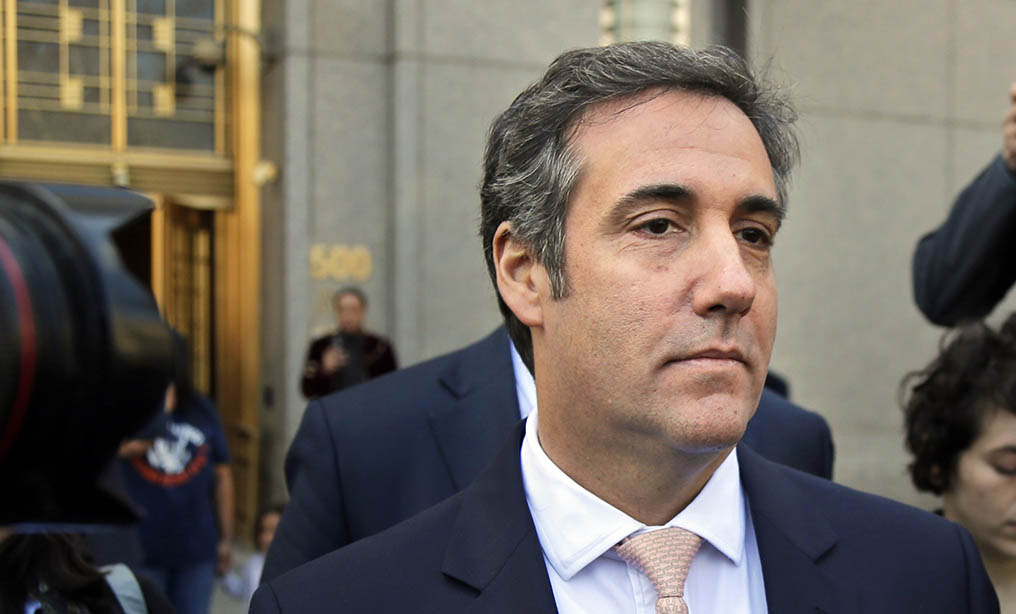Michael Cohen's Guilty Plea Puts Spotlight on Defense Lawyers' Role
McDermott partner Stephen Ryan has plenty of company among attorneys with prominent clients who lied to the government.
December 10, 2018 at 02:20 PM
5 minute read
The original version of this story was published on New York Law Journal
 Michael Cohen. (Photo: Seth Wenig/AP)
Michael Cohen. (Photo: Seth Wenig/AP)
Michael Cohen's admission that he lied to Congress, along with details in his recent sentencing materials, raise questions about how closely he followed the advice of his then-lawyer, a McDermott Will & Emery partner, some legal observers said.
But Cohen's former lawyer is far from the only attorney who has had a client go astray in government interviews, said legal ethics experts, noting that strong-willed defendants have frequently lied to the government, even when represented by skilled counsel.
Cohen, President Donald Trump's former personal attorney, pleaded guilty Nov. 29 to lying to Congress about the timeline of a Russian real estate project pursued by Trump. Cohen was represented by McDermott partner Stephen Ryan at the time he made the false statements.
Sentencing materials in the last two weeks refer to his former counsel. “Michael remained in close and regular contact with White House-based staff and legal counsel to Client-1,” referring to Trump, Cohen's sentencing memo said, “in the weeks during which his then-counsel prepared his written response to the congressional committees.”
The special counsel's office, in its own sentencing memorandum to a judge Dec. 7, said Cohen's lies to Congress were “deliberate and premeditated” and “his false statements did not spring spontaneously.”
New York Law School professor Rebecca Roiphe said the fact that Cohen and Trump's team were in communication at the time raises questions “given that his lawyers are supposed to be looking out for his interests alone.”
“It's in your client's interest to coordinate with other counsel with other individuals,” but that appears risky here, said Roiphe, when there's a “really powerful person” whose interests may differ from a client's.
“Before you prepare your client to testify to Congress, you really need to push them, you really need to try to get to the bottom of the story” while also breaking down the loyalty between the client and any other person, Roiphe said.
Jessica Roth, an ethics professor at Benjamin N. Cardozo School of Law, who spoke only generally on attorney ethics, said lawyers “have a duty to investigate the facts” and “not to take the facts as presented by the clients the first time at face value.”
Ryan, a well-respected white-collar criminal defense lawyer at McDermott who has practiced law for nearly 40 years and is a former federal prosecutor, declined to comment for this article.
Cohen, who is scheduled to be sentenced Dec. 12, didn't respond to a message seeking comment. His current attorney, Guy Petrillo, of Petrillo Klein & Boxer, also had no immediate comment.
Some legal ethics experts and criminal defense attorneys cautioned against faulting Ryan or any other attorney representing Cohen at the time of the false statement. It would be hard, without knowing more facts, “to think it's the lawyer's negligence and not the client's wrongdoing,” said Bruce Green, an ethics professor at Fordham Law School.
Cohen is one of many in special counsel Robert Mueller's investigation to plead guilty to false statements. Others include George Papadopoulos, Rick Gates, Michael Flynn and Alex van der Zwaan, a former associate of Skadden, Arps, Slate, Meagher & Flom.
From Bill Clinton to Martha Stewart
History abounds with prominent figures, who, despite access to top counsel, were caught lying. Bill Clinton admitted to ”testifying falsely” when he denied an affair with Monica Lewinsky during a deposition in the Paula Jones sexual harassment suit. Pitcher Roger Clemens was indicted for lying to Congress when he said he never used performance-enhancing drugs. (He was later acquitted.)
Wachtell, Lipton, Rosen & Katz represented Martha Stewart and her company when its lawyers accompanied her on interviews with federal investigators in early 2002 that became the basis for charges against Stewart. Wachtell's representation was scrutinized in press reports.
A false statement charge can be a little embarrassing for the lawyer, Green said. “I don't think it adds luster to your representation. I don't think it's helpful” but “I don't think it suggests suborning perjury.”
“Lying and covering up is not uncommon, even when people have good legal advice,” he said.
Unless a lawyer knows that his or her client is being deceptive, it's hard to know what more a lawyer could have done to prevent a false statement charge, said white-collar attorney Harry Sandick, a partner at Patterson Belknap Webb & Tyler.
“No lawyer wants to find that their client may have made false statements to the government, but it can happen, even to talented lawyers,” Sandick said.
While there are some cases where government interviews may help a client, “the cases which are disasters certainly stand out. It's why many attorneys would tell their client to plead the Fifth” or not cooperate, said Paul DerOhannesian, an Albany-based criminal defense attorney who routinely represents clients in false statement cases. ”It's extremely perilous to engage in these interviews because [the lawyer and the client] don't know if they have all the information.”
Many attorneys advise against interviews, “but you have clients who want to,” DerOhannesian said, especially when they insist they have nothing to hide or where there are political or employment consequences for taking the Fifth.
Ultimately it was Cohen who made the decision to answer any questions from Congress that could have been self-incriminating.
“There are times where the attorney's advice will be, 'It's your decision, but I strongly advise against you speaking,'” and still the client may decide to, said Tim Hoover, a Hodgson Russ partner who has defended several clients in false statement cases. “The decision to speak with investigators or invoke the Fifth Amendment in response to a request for an interview is a decision vested with the client.”
B. Colby Hamilton contributed to this report.
This content has been archived. It is available through our partners, LexisNexis® and Bloomberg Law.
To view this content, please continue to their sites.
Not a Lexis Subscriber?
Subscribe Now
Not a Bloomberg Law Subscriber?
Subscribe Now
NOT FOR REPRINT
© 2025 ALM Global, LLC, All Rights Reserved. Request academic re-use from www.copyright.com. All other uses, submit a request to [email protected]. For more information visit Asset & Logo Licensing.
You Might Like
View All
'Better of the Split': District Judge Weighs Circuit Divide in Considering Who Pays Decades-Old Medical Bill

K&L Gates Files String of Suits Against Electronics Manufacturer's Competitors, Brightness Misrepresentations
3 minute read
Ill. Class Action Claims Cannabis Companies Sell Products with Excessive THC Content
4 minute read
Plaintiffs Attorneys Awarded $113K on $1 Judgment in Noise Ordinance Dispute
4 minute readTrending Stories
Who Got The Work
J. Brugh Lower of Gibbons has entered an appearance for industrial equipment supplier Devco Corporation in a pending trademark infringement lawsuit. The suit, accusing the defendant of selling knock-off Graco products, was filed Dec. 18 in New Jersey District Court by Rivkin Radler on behalf of Graco Inc. and Graco Minnesota. The case, assigned to U.S. District Judge Zahid N. Quraishi, is 3:24-cv-11294, Graco Inc. et al v. Devco Corporation.
Who Got The Work
Rebecca Maller-Stein and Kent A. Yalowitz of Arnold & Porter Kaye Scholer have entered their appearances for Hanaco Venture Capital and its executives, Lior Prosor and David Frankel, in a pending securities lawsuit. The action, filed on Dec. 24 in New York Southern District Court by Zell, Aron & Co. on behalf of Goldeneye Advisors, accuses the defendants of negligently and fraudulently managing the plaintiff's $1 million investment. The case, assigned to U.S. District Judge Vernon S. Broderick, is 1:24-cv-09918, Goldeneye Advisors, LLC v. Hanaco Venture Capital, Ltd. et al.
Who Got The Work
Attorneys from A&O Shearman has stepped in as defense counsel for Toronto-Dominion Bank and other defendants in a pending securities class action. The suit, filed Dec. 11 in New York Southern District Court by Bleichmar Fonti & Auld, accuses the defendants of concealing the bank's 'pervasive' deficiencies in regards to its compliance with the Bank Secrecy Act and the quality of its anti-money laundering controls. The case, assigned to U.S. District Judge Arun Subramanian, is 1:24-cv-09445, Gonzalez v. The Toronto-Dominion Bank et al.
Who Got The Work
Crown Castle International, a Pennsylvania company providing shared communications infrastructure, has turned to Luke D. Wolf of Gordon Rees Scully Mansukhani to fend off a pending breach-of-contract lawsuit. The court action, filed Nov. 25 in Michigan Eastern District Court by Hooper Hathaway PC on behalf of The Town Residences LLC, accuses Crown Castle of failing to transfer approximately $30,000 in utility payments from T-Mobile in breach of a roof-top lease and assignment agreement. The case, assigned to U.S. District Judge Susan K. Declercq, is 2:24-cv-13131, The Town Residences LLC v. T-Mobile US, Inc. et al.
Who Got The Work
Wilfred P. Coronato and Daniel M. Schwartz of McCarter & English have stepped in as defense counsel to Electrolux Home Products Inc. in a pending product liability lawsuit. The court action, filed Nov. 26 in New York Eastern District Court by Poulos Lopiccolo PC and Nagel Rice LLP on behalf of David Stern, alleges that the defendant's refrigerators’ drawers and shelving repeatedly break and fall apart within months after purchase. The case, assigned to U.S. District Judge Joan M. Azrack, is 2:24-cv-08204, Stern v. Electrolux Home Products, Inc.
Featured Firms
Law Offices of Gary Martin Hays & Associates, P.C.
(470) 294-1674
Law Offices of Mark E. Salomone
(857) 444-6468
Smith & Hassler
(713) 739-1250








